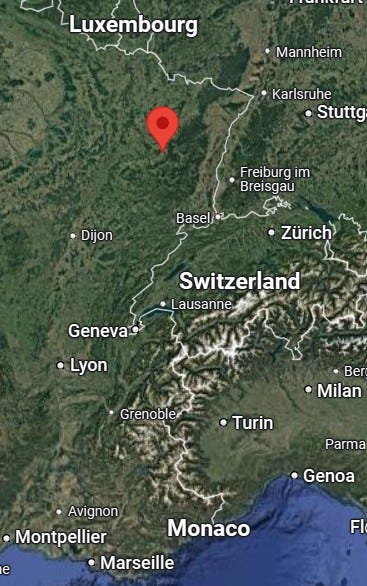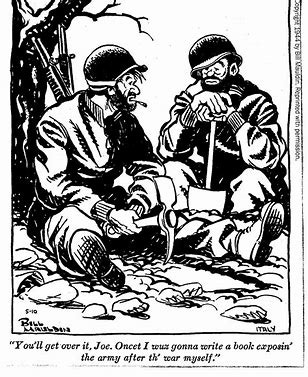It was in fact a stroke of luck that the men of my father’s regimental combat team, fresh off the boat, were replacing the grizzled veterans, no older than themselves, of the 45th Division. During their brief encounter, they were given hard-won information on how to survive at the front.
Some in the 100th Division like the 325th Engineers had been going through the Army’s official training for over a year. But the Army’s official training was coming from the books and protocols of the military schools, not what was happening on the ground. Green troops paid a terrible price because of it.
Just how much they needed advice became clear to one squad on October 31st, that first night at the front near Fremifontaine. One of the infantry squads climbed a slope in the dark, rolled out sleeping bags in a clearing under the pine trees, and fell asleep. Early in the morning they woke up to a loud explosion and a piercing cry of “medic, medic.” They had no idea what to think. They clambered out of their bags, staring, when a second cry went up. Soon shouts of “don’t move, don’t move” filled the air. No part of their Stateside training had warned them. They’d unrolled their sleeping bags in a minefield. It was of course precisely because it was an attractive clearing that the Germans had mined it. The men had to wait there, new to the front, petrified, listening to the cries, while the engineers cleared a path, marked by unrolled bandages.1

That morning, November 1, 1944, the 399th regimental combat team shifted toward Rambervillers to relieve the 179th regimental combat team, unit for unit. Infantry Company A of the 399th relieved Company A of the 179th foxhole for foxhole. Or at least, that was supposed to be how it worked. The 179th sergeant asked the 399th sergeant how many men he had. “Forty,” came the reply. The veteran company had 9 men left. They needed to dig a lot more foxholes.
Or, as the writers of the 399th unit history said, the exchange went like this:
“Where are your ammo bags, and packs, and bayonets, and overcoats?”
“Threw ‘em away.”
“Where are the Jerries?”
“Right in front of you.”
“Where are the front lines?”
“You’re them.”
The nonchalant vets of Sicily, Anzio, and the Riviera picked up all their loose equipment—one rifle—and ambled away. “Good hunting, fellas.” … The trees dripped noiselessly on the mossy floor.2
The green troops studied the foxholes and realized they were not like the ones they’d been trained to dig. The foxholes were 3 to 4 feet in depth and width and 6 feet in length. They were covered over in branches and tree trunks and on top of that was the excavated dirt and sod to protect the occupants from tree bursts and shrapnel. They used these as the model as they dug enough for the whole company.
Judging by the memoirs, the 45th didn’t immediately walk off. The authors of the 399th unit history had a flare for the dramatic. The memoirs report that the veterans stayed long enough to give them some pointers. For instance, they pointed out it was good to have two foxholes—one to shoot out of and one to live in. They were told to get their hands on Thompson machine guns rather than the “grease guns,” cheaply made guns of stamped metal that looked like the tool for squirting grease into machinery.3 The bolt springs weren’t made right and would fail to lift bullets out of the magazine. The muzzle velocity was low, and they only worked at short-range. They were told how handy condoms were to cover the muzzle of their rifles to keep out the incessant rain. And they were warned that the Germans liked to set up two machine guns. One would fire tracer bullets chest high. When a dogface tried to move below the stream by crouching, the second machine gun would aim low and rip his abdomen open.
One of the first things the men had to learn was how to master the overwhelming fear. The memoirs written long after the war particularly remember the men in command who broke right away. The memory of watching the noncoms and officers whose judgment literally meant life and death fall apart was vivid decades later. That first night, an artillery captain simply ran. One of the men in the unit commented decades later, “we never knew where he ran to.”4 One of the old peacetime Army sergeants who had been brutally hard on the draftees “accidentally” discharged his weapon and shot himself in the foot that first night.5
T.C. told me that courage was a funny thing:
You can be a brave person or scared to death. One of the bravest guys was scared to death the whole time. He volunteered for this thing. He cried the whole time. He was sick he was so scared. And yet he was the most decorated. He was at the right place at the right time and did the right thing. Lots of things he did he got a decoration for. The company got a decoration. The whole battalion got something for it. I got it too. We got some action there.6
Dad had a story that he told. He brought it up again in his last days, when he was fading away, and I was just trying to get him to tell stories as an activity we could share. Dad had been a commanding figure—tall, barrel-chested, deep voiced. Nothing ever phased him. He liked to tell stories where he was mocking himself. But that was before I realized that the man I knew was not the green first lieutenant in his twenties in the dark dripping forests of eastern France. I didn’t realize how being an officer had shaped him.
The story, which he told several times, was that he was working with a sergeant from the 45th Division to gain valuable information. Almost certainly he was working with the sergeant because that platoon’s lieutenant had been killed and not yet replaced. The mortality rate for lieutenants in the European Theater of Operations was extremely high. The veteran of Anzio was filling him in on German tactics, including the nerve-wracking business of clearing mines, when they came under attack. I’m guessing it was the dreaded 88s because it was the most common attack where they were and because there’s a trick that experienced men knew. The shells from an 88 go faster than the speed of sound. The ones that have your name on them fly silently ahead of the sound wave. If you can hear them screaming in, they aren’t for you. But they are still extremely loud and concussive. Dad said that he just walked into the woods—away from the attack, away from the task at hand, and away from the war-worn sergeant from the 45th Division. In the woods, he managed to pull himself together and went back to the sergeant, apologizing. The sergeant shrugged and said, “don’t worry. It’s the good ones who come back.”
I think in that moment that unknown sergeant gave Dad a great gift. More than teaching the tricks of disarming German mines, that sergeant, who had been through so much, taught Dad that it wasn’t whether you felt fear, it was what you did in spite of it. T.C. told me, “I tell you one thing about your dad. He didn't get overly excited about stuff. Others used to panic or go crazy if something had to be done."7
After Dad died, one of the men from his platoon, a stranger, reached out to Mom to tell her that he was sure that he’d survived the war because of Dad's cool head under fire. A lot of men owe a lot to an unknown soldier in the 120th Combat Engineers.
“Forgotten Memories of World War II, Sam L. Resnick”
399th history, P. 25
Hancock, p. 75.
Fishpaw
Khoury
T. C. Moore, 2001
T. C. Moore, 2001



